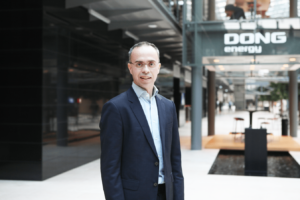Business
An exciting journey and a unique place to work
This article is more than 11 years old.
Italian senior director Federico Castelli tells us about his workplace

Federico Castelli, a senior director at DONG Energy (photo: DONG Energy)
What is your job title and what does a typical day at work comprise?
I’m a senior director in the subunit called New Bio Solutions, which is part of DONG Energy’s Thermal Power business unit. I started at DONG Energy in February 2011 as head of corporate strategy before moving to my current position at the beginning of this year.
In my current role I’m responsible for the strategy and finance department as well as the REnescience commercial team – REnescience is a new green technology that DONG Energy has been developing for the past 15-20 years; it converts unsorted municipal solid waste into valuable products such as bio-gas and recyclable plastics.
What I do in a typical day at work depends a lot on where I am. When I am at the office, I spend about a third of my time in meetings, a third managing people and a third executing tasks myself. Nevertheless, my responsibilities as commercial head of REnescience mean I also have to travel and be away from my office fairly frequently.
Typically these trips involve whole days of meetings with current and potential clients and partners, as well as – most of the time – business dinners.
Where did you work before you joined DONG Energy?
I moved to Denmark to work for DONG Energy. Before that I was working in London as a senior manager for the management consultancy firm AT Kearney. I am an engineer by education, and before starting the consulting experience, I worked as project engineer for a multinational company in Italy as well as abroad in Europe.
What are some of the main differences and similarities between Danes and Italians, in your experience?
I believe that there are no major differences between Danes and Italians – or at least not as big as the ones with some other countries, even in Europe. People from both countries are quite pragmatic: if you put Danes and Italians in a room, they’ll get things done at the end of the day. And both nationalities are passionate: Danes are just more private about it.
Among the differences, I would say, is the approach to society, the community and to the team. Danes have a much greater sense of social and community responsibility than I believe we Italians have. And this also translates at work into quite different team dynamics. Danes are better than Italians at working together and fully committing themselves once decisions have been made.
Is there anything about working for DONG Energy that sets it apart from previous workplaces?
DONG Energy is a unique place to work. It has set itself apart from the competition as one of the most progressive energy companies in Europe in terms of the green transition. This transition is impacting our daily work – in a good way. DONG Energy might not be as big as some of its German, British and even Italian competitors, but it is one of the few companies with a clear growth and sustainability story.
All these elements make working for DONG Energy a unique experience and very different from my previous jobs.
What is the best thing about working for DONG Energy?
The element of personal fulfilment and the feeling of doing something valuable for society and for the future. It’s exciting to be involved in the transformational journey of moving the energy sector forward from ‘black to green’ and to see the leadership committed to it pushing the organisation to make change happen.
The energy sector is the focus of a lot of public and political attention – are you aware of this in your day-to-day work?
Yes, we have a daily obligation to satisfy the Danish customers in two ways: they are our clients when buying our energy and services, and they are our owners through the governmental participation in DONG Energy equity. We need to constantly deliver value to them on both sides – as a client and as an owner – and this is not an easy balance to find.
In the Danish media, a lot is made of Denmark’s ‘green credentials’ when it comes to energy – when you represent Dong Energy internationally, do you get the impression that this view is shared by those outside the country?
Denmark has definitely established itself globally as a green society – you can see it wherever you travel – and DONG Energy has a key role in developing and maintaining this position in the future. But already now. When it comes to doing business abroad in green technology, the established reputation places you in a better and more competitive position from the very start.










































